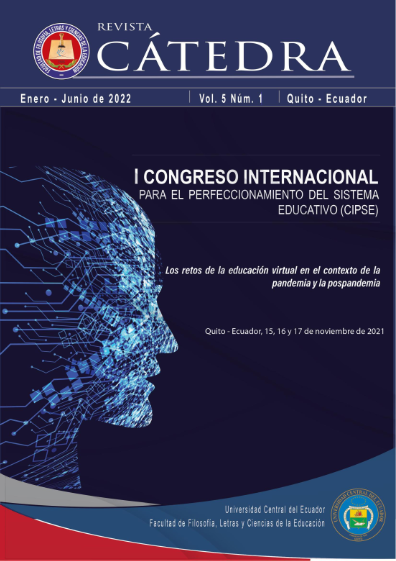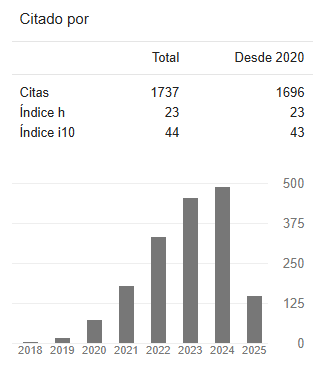Educaplay: a gamification tool for academic performance in virtual education during the pandemic covid-19
DOI:
https://doi.org/10.29166/catedra.v5i1.3391Keywords:
education, e-learning, gamification, academic performance, ICT, virtual educationAbstract
This research is based on the use of the gamification tool Educaplay and its contribution to the academic performance of elementary school students. The objective was to analyze the use of Educaplay as a didactic resource within virtual education and how this process improves students' performance, taking into consideration the change of model and application of new methodologies within virtual classes. The methodology applied is of an experimental-exploratory type, through a quali-quantitative approach that was collected by applying a survey identified as pretest which was validated by Cronbach's Alpha statistic with a value of 0.842 and subsequently the application of the Technology Acceptance Model (TAM) as posttest; the activities were developed using the SAPIE methodology; the study population was 70 elementary basic education students to whom the experiment was applied based on gamification resource using the web tool Educaplay. The results of the research allowed to know if the students improved their academic performance with the use of gamification resources that motivate their active participation, collaborative work, and that the teacher is the one who generates his own resources, based on the needs of the students.
Downloads
References
Behl, A., Jayawardena, N., Ishizaka, A., Gupta, M., & Shankar, A. (2021). Gamification and gigification: A multidimensional theoretical approach. Journal of Business Research, In Press, Corrected Proof. doi:https://doi.org/10.1016/j.jbusres.2021.09.023
Farjón, D., Smits, A., & Voogt, J. (2019). Technology integration of pre-service teachers explained by attitudes and beliefs, competency, access, and experience. Computers & Education, 81-93. doi:https://doi.org/https://doi.org/10.1016/j.compedu.2018.11.010
Garrido-Astray, M., Gómez, G., Márquez, G., Poggio-Lagares, L., & Gómez-Garrido, S. (2019). The impact of digital resources in the learning and the development of the competence Analysis and Synthesis. Educación Médica, 74-78. doi:https://doi.org/10.1016/j.edumed.2018.02.011
Jaramillo-Baquerizo, C. (2021). Analyzing the transition from face-to-face to remote education: an experience in higher education during the COVID-19 pandemic. Cátedra, 91-106. doi:https://doi.org/10.29166/catedra.v4i3.3173
Jingcheng, Q., Yancong, M., Zhigeng, P., & Xubo, Y. (2020). Effects of Virtual-real fusion on immersion, presence, and learning performance in laboratory education. Hardware, 569-584. doi:https://doi.org/10.1016/j.vrih.2020.07.010
Krath, J. S. (2021). Revealing the theoretical basis of gamification: A systematic review and analysis of theory in research on gamification, serious games and game-based learning. Computers in Human Behavior, 106963. doi:https://doi.org/10.1016/j.chb.2021.106963
MINEDUC. (2020). Ministerio de Educación. Obtenido de Mineduc: https://educacion.gob.ec/wp-content/uploads/downloads/2021/03/Guia-Contencion-Emocional.pdf
MINEDUC. (2020). Recursos2. Obtenido de https://recursos2.educacion.gob.ec/
Min-Jeong, C., & Joon Pio, H. (2021). The emergence of virtual education during the COVID-19 pandemic: The past, present, and future of the plastic surgery education. Reconstructive & Aesthetic Surgery, 1413-1421.
Nikoletta-Zampeta, L., Kostas, K., Vassilios, A., & Juho, H. (2021). Gamification to avoid cognitive biases: An experiment of gamifying a forecasting course. Technological Forecasting and Social Change, 120725. doi:https://doi.org/10.1016/j.techfore.2021.120725
Parra-González, M., López-Belmonte, J., egura-Robles, A., & Moreno-Guerrero, A.-J. (2021). Gamification and flipped learning and their influence on aspects related to the teaching-learning process. Heliyon, e06254. doi:https://doi.org/10.1016/j.heliyon.2021.e06254
Peña, D., Lizcano, D., & Martínez-Álvarez, I. (2021). Learning through play: Gamification model in university-level distance learning. Entertainment Computing, 100430. doi:https://doi.org/10.1016/j.entcom.2021.100430
Rabab-Ali, A., Shahla, A., Mehrbakhsh, N., Minaei-Bidgoli, B., Khan-Nayer, F., Samad, S., . . . Othman, I. (2021). The impact of coronavirus pandemic (COVID-19) on education: The role of virtual and remote laboratories in education. Technology in Society, 101728. doi:https://doi.org/10.1016/j.techsoc.2021.101728
Ramandeep, S., Britty, B., Rajdeep, S., & Ashish, S. (2021). Role of virtual modules to supplement neurosurgery education during COVID-19. Neuroscience, 125-130. doi:https://doi.org/10.1016/j.jocn.2021.06.039
Román-Calderón, J., Robledo-Ardila, C., & Velez-Calle, A. (2021). Global virtual teams in education: Do peer assessments motivate student effort? Evaluation, 101021. doi:https://doi.org/10.1016/j.stueduc.2021.101021
Zamzami, Z., Wah-Chu, S., Shujahat, M., & Perera, C. (2020). The impact of gamification on learning and instruction: A systematic review of empirical evidence. Educational Research Review, 100326. doi:https://doi.org/10.1016/j.edurev.2020.100326









